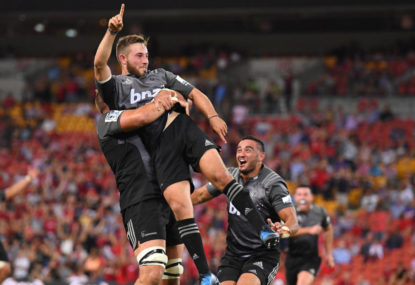The Super Rugby 2017 final, won by the Crusaders over the favourites the Lions 25-17, was played with such ferocious intensity and high skills from both sides that the multitude of problems that have plagued the tournament this year were reduced to insignificance during the 80 minutes or so of battle on the field.
As Shakespeare’s Hamlet noted, “the play’s the thing …”
In the end, tournaments like Super Rugby stand or fall by what happens on the field, not what happens or does not happen from decisions made in the offices of the administrators.
And this was a memorable final, the equal or better than virtually any other since the tournament started in 1996.
The quality of the final and the response from the crowd and the players involved in it revealed this is a tournament that is almost impervious to its off-field problems. Notice I use the qualifier “almost.”
It was a startling and moving moment, for instance, when the vast home crowd rose to their feet at the end of the match and roared their support for their side with rolling chants of “Lions, Lions, Lions…” This was the sort of emotionally-committed response you would expect from supporters of one of the great football clubs.
To hear rugby supporters so connected with their team as the Lions supporters clearly were was one of the most exciting rugby moments of the year.
The truth about the Super Rugby tournament and its primary attraction as a competition is that it is a fiendishly hard tournament to win. The iron Darwinian law of ‘the survival of the fittest’ applies to this tournament, virtually above all others in world rugby.
To begin with, there is the travel component. No other rugby tournament requires teams to play matches in countries as far distant from each other as South Africa, Australia, New Zealand, Argentina, Singapore and Japan.
Then, for this year at least, there is the complicated system designating home finals in South Africa, Australia and New Zealand to the respective conference winners, immaterial of the number of points collected during the tournament.
A team has to win its local conference to have any chance of winning the tournament.
And complicating matters is the fact that the stronger the conference, like the New Zealand conference this year, the harder it is to win it. Conversely, the weaker the conference, the easier it is to win.
So the Crusaders, guilty of losing only one match in the Super Rugby schedule despite playing in the dominant New Zealand conference, found themselves having to travel to Johannesburg only hours after winning their home semi-final against the Highlanders at Christchurch the previous weekend.
Even though the Crusaders had played in 11 finals and had won seven of them, few of the pundits, even in New Zealand, gave them much hope of defeating the Lions, a team that lost the final last year going down to the Hurricanes in Wellington.
Playing at home this year against the Hurricanes in the semi-final, the Lions ran rampant in the last 20 minutes to record a surprisingly easy victory.
The tyranny of distance is one of the most potent weapons that home teams have in most Super Rugby finals.
So the new coach of the Crusaders, Scott Robertson, break-dance exponent extraordinary and fine flanker in his playing days, has pulled off something of a coaching miracle in his first Super Rugby tournament.
The Crusaders have been invigorated by his coaching and that of his staff in the same way the Waratahs were invigorated under Michael Cheika.
Robertson identified that the east-west passing game of the Todd Blackadder Crusaders was too easy to defend against. The lack of pace in the back four, too, accentuated the passive, lateral nature of the Crusader’s attacking systems.
Here some shrewd selecting (is anyone in Australian rugby taking note!) came into play.
Robertson brought in David Havili to play as a running fullback in the Ben Smith mode. It is interesting, for example, that the worst attacking game the Crusaders played all season was against the British and Irish Lions with Israel Dagg at fullback.
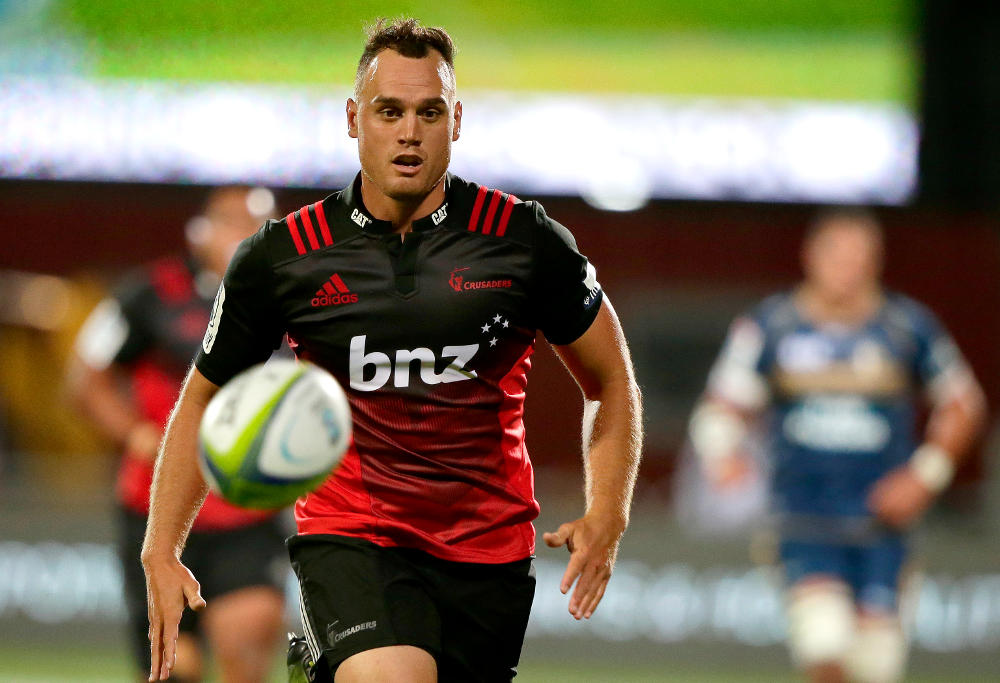
(AP Photo/Mark Baker)
Dagg, on the wing in the final, played splendidly as a catcher of high balls, on defence and attack. His slinky running opened up gaps in the Lions defence which he further exploited with some adroit passing.
Dagg is developing a new winger/fullback role in the process of moving from the back of the field to the side of the field.
The Robertson Crusaders, too, had real power and pace on the wing with the conversion of Seta Tamanivalu from the centre position. This was another Robertson gamble that has paid off handsomely for the Crusaders.
It was Tamanivalu’s aggressive break-out from just outside his own 22 and his subsequent runaway try that gave the Crusaders an early 7-0 lead.
I would say that the only side capable of beating the Lions at Johannesburg in the final were the Crusaders with their stack of All Blacks in the forwards and a key All Black, Ryan Crotty (my man of the match), dominating the midfield in attack and defence.
A measure of the achievement of the Crusaders is that their victory was only the second time a final has been won by a team playing outside the country where its franchise resides.
The Crusaders under Robbie Deans won a final against the Brumbies at Canberra.
This was the first time, too, that a South African team has lost a home final.
The achievement of the Crusaders in defying all the predictions and winning at altitude against a very good Lions side cannot be overrated.
Just as an aside, if the Springboks can take the main elements of the Lions’ ball-in-hand power game into their game plan and add some sophistication to some of their attacking plays, they are going to be an extremely difficult team for any of their opponents, especially at home, in the coming Rugby Championship tournament.
The Crusaders obviously were helped by the fact that the Lions played the last 40 minutes of the final with 14 players.
One other thought, too, arises out of this final. The conditions in South Africa and the history of the nation have created a way of playing rugby that is direct, physical, emotional and always confrontational, a method that is unique to the Republic.
This different and successful method of playing rugby is one of the reasons why the New Zealand Rugby Union will always support having South African teams in any form of Super Rugby in the future.
The heavy emphasis on set piece confrontations, bulk and collisions in the South African game is a useful and, indeed necessary, reminder to New Zealand coaches, administrators and players that the highly successful ‘basketball’ rugby favoured in their country needs always to be balanced by a physical element in attack and defence.
The Hurricanes were overwhelmed in the end in their semi-final at Johannesburg because their set pieces collapsed.
A main reason why the Crusaders won the final is because their set pieces (their scrum particularly when Jaco Peyper finally worked out the shonky tactics of the Lions) were very much better than those of the Lions. And it is the emphasis on set pieces that is the hallmark of South African rugby.
Now, back to the final.
The quality of play from both sides, on attack and defence, were more than worthy of the occasion and the record crowd of 62,000 and more who crammed into Emirates Airline Park in Johannesburg.
When you see hard-shouldered and clever rugby of this quality, played at a blistering pace throughout 80 minutes, you understand why the southern hemisphere sides that are tempered in the heat of Super Rugby battles have won all but one of the eight Rugby World Cup tournaments.
At the end of the final, with Richard Mo’unga booting a penalty into touch with time up, the Crusaders players exploded into a sort of joyous exuberance of leaping, embracing, laughing and back slapping that only teams that have achieved an impossible dream are capable of demonstrating.
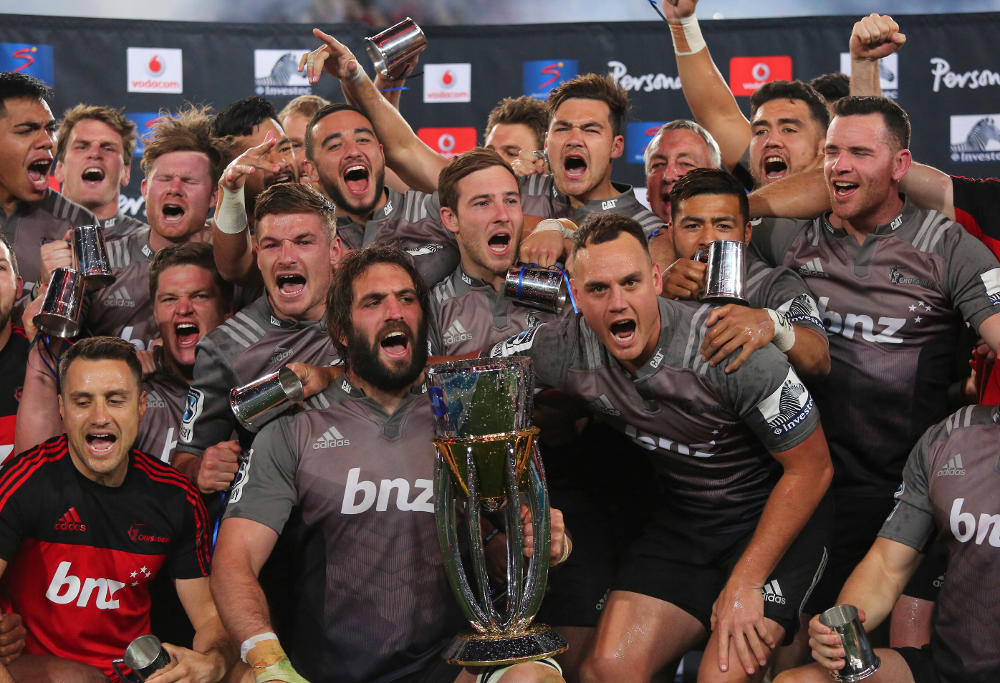
(AP Photo/Phil Magakoe)
You had hardened All Blacks back-slapping and high-fiving their excited younger teammates as if they had won their first trophy, even though many of the squad had won a winners medal at the Rugby World Cup 2015 tournament and three of the players had won a Super Rugby tournament final in 2008.
I hope SANZAAR officials take notice of the passion of the spectators and the players in the final. This tournament is not something to trifle with, to experiment with too expansively or to bring in systems that compromise the integrity of the final outcome of the tournament.
To put it bluntly, SANZAAR needs to look carefully at making the tournament fairer and easier for spectators to follow by ensuring that all teams play each other. It is a nonsense that the Lions got into the finals without playing a single New Zealand side.
Abolish the conferences and let the finals teams and locations reflect the standings of the top sides in terms of their points accumulation.
And there needs to be a return to neutral referees for all the finals.
The appointment of South African Jaco Peyper to referee the final was described by the New Zealand Herald’s Gregor Paul this way:
“The men running Super Rugby seem determined to metaphorically throw the competition in the microwave, set the thing on high and watch it explode in a hopeless, devastating mess. SANZAAR really had just one job to take care of ahead of the Super Rugby final at Ellis Park – appoint neutral officials.”
And even Jake White, a South African who believed the Lions would win, was not impressed with Peyper’s appointment. PlanetRugby quoted him making these valid points:
“In a sport where coaches get hired and fired on results, and television rights are in the millions of dollars, how do we not have a neutral referee in these games?
“Do you think New Zealand will ever play in a World Cup final with a Kiwi ref? If the answer is no, then how can we accept it in Super Rugby?”
As it happens, the only crucial decision Peyper made was to give a red card to Lions flanker Kwagga Smith late in the first half.
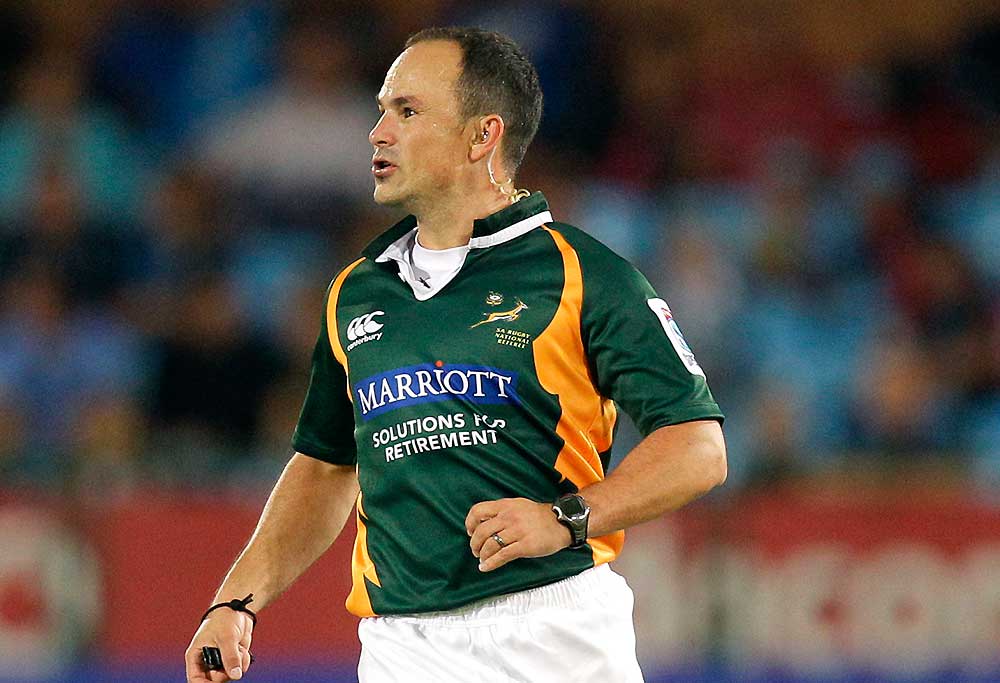
(AP Photo/Themba Hadebe)
The decision had to be made this way, given that Smith had mistimed his running and charged straight into David Havili while the Crusaders fullback was in the air. Havili landed on his neck, making the red card mandatory.
I received an interesting email from a South African friend who has this to say about the incident:
“The Red card, in terms of the Laws, was justified. But is it time the Law is amended to allow a substitute played to make up the numbers in the case of the unintentional stupidity of Kwagga Smith, but not for blatant and dangerous foul play?
“I know you will say, where is the distinction?
“But I think anybody who has played rugby can see the difference between an over-zealous but dumb challenge like Kwagga Smith’s clumsy effort, and blatant thuggery.”
This is an interesting contribution to what is going to be an ongoing debate within the rugby game. The fact is that this final and the second Test between New Zealand and the British and Irish Lions were both compromised by justified red card rulings.
It is clear that Smith’s challenge was unintentional.
But could Sonny Bill Williams’ head-high shoulder charge in the Lions Test have been deemed unintentional?
My guess is that All Blacks supporters would say that the charge was unintentional and that Lions supporters would disagree.
I favour a 20-minute sin bin punishment for a red card infringement, while accepting that the replacement concept has merits that deserve to be considered.
Perhaps the compromise is a 20-minute sin bin together with a compulsory replacement.
Back to Jaco Peyper and the final. The penalty count was 11-11. And generally, the 50-50 decisions went 50-50 to both teams. He had a good final.
But perception is the issue here. It is not possible for local referees to seem to be fair if they rule consistently or make a controversial ruling, even if the rulings are fair, against the visiting side.
An Australian friend sent me an email that sums up accurately, I believe, the essential truths about the final:
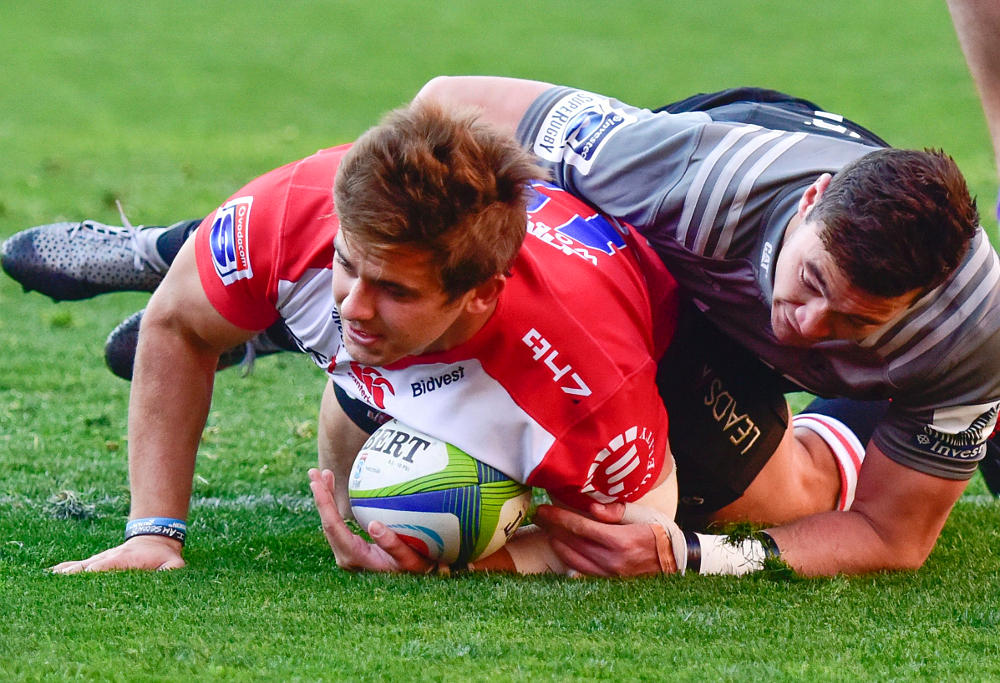
(Christiann Kotze/AFP/Getty Images)
“The Crusaders had broken the Lions early in the second half to lead 25-3.
“The Lions were down a man. The Crusaders looked like they were going to ran away with it. The Lions thought otherwise. With strength and creativity they hit back. Two converted tries. 17-25. About eight minutes remain.
“The Crusaders played like the champions they are. They did not stifle, they did not kill time.
“The final was played in great spirit. No Australian franchise can enter the paddock against these teams other than receiving a thrashing.”
This is a summary that tells the truth about the state of Australian rugby right now, I fear.
I know looking ahead is fraught with danger in these matters but I think the Lions, without their inspirational coach Johan Ackermann, will struggle next year. And especially so, if the bossy Zuma government officials insist on the franchise falling into line on the black quota system within South African rugby like the other franchises.
As for the Crusaders, they look to be favourites to win next year’s Super Rugby tournament, whatever configuration SANZAAR applies and whatever system of refereeing appointments it decides to implement.





























































































